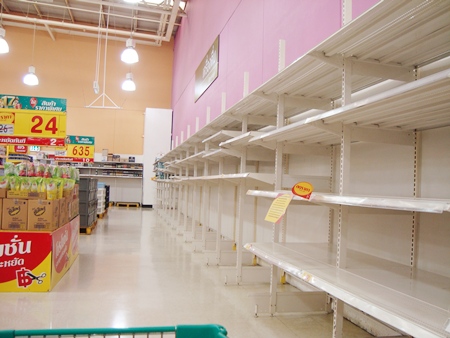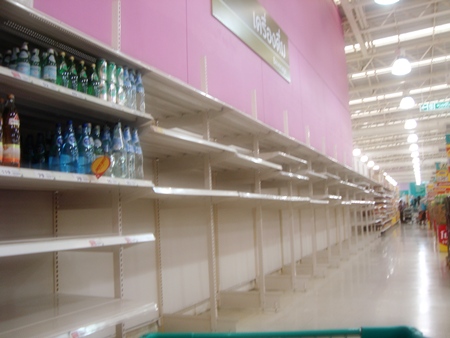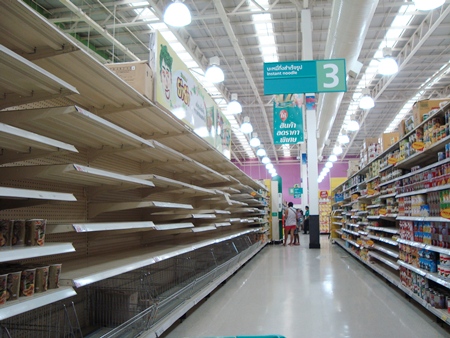The worst flooding in decades is not only affecting families directly in its path, but in one way or another, its effecting nearly everyone in the kingdom.
Locally, kind hearted citizens are setting up collection points for essential goods and cash to help the tens of thousands of victims, the Thai Navy is building temporary floating structures for those that have lost their homes, and in general, as they have done in the past, people are rushing to the aid of stricken people all over the country.
A side effect of the massive flooding is the increasingly evident disruption to commerce. Anyone who has gone shopping lately most certainly has noticed empty shelves, higher prices, and goods that were once found nearly everywhere are now difficult to find.
 Shoppers are finding an increasing amount of shelves are empty in the larger department stores.
Shoppers are finding an increasing amount of shelves are empty in the larger department stores.
Flooding in central Thailand has cut off many transportation routes, making it either difficult or impossible to transport goods from the manufacturer to the markets and department stores. But perhaps even more disruptive are the flooded industrial estates in Phranakorn Sri Ayuthaya and Pathum Thani where so many of the country’s essential goods are processed before shipping.
Meat, poultry, dried foods and eggs top the list of hard to find and increasingly more expensive non-durable goods.
Drinking water and canned goods are also becoming scarcer as the availability of raw materials for packaging has been reduced.
Signs have been popping up on empty shelves in major department stores, apologizing for the inconvenience and asking for patience.
Large retailers and department stores are not the only places suffering, as many small merchants are having to do with less of an inventory as well.
Boongnern Mookaum, a woman who runs a food stall near Wat Chaimongkol in South Pattaya, said that items such as “Cow-peas, originally 30 baht per kg, have increased to 50 baht per kg; bird chili, originally 60 baht per kg, increased to 100 baht per kg; rice from 1000 baht for 49 kg has increased to 1,100 baht.”
She said, however, that she will try her best to keep her prices down. “Even though prices have increased … I do not want my customers to suffer … I will still keep my regular customers and this should keep me satisfied for awhile.”
Prices of other vegetables have also increased slightly, but evidently demand is down as some of the vegetables are rotting in the damp environment.
J. Mai, a poultry merchant, said that large chickens and large eggs have become scarcer since the floods began mid-summer. She said she heard the reason for this is, “Flooding at major chicken farms in Phranakorn Sri Ayuthaya has resulted in the death of many chickens.”
The government, however, believes that demand is the challenge, not supply. Deputy Commercial Minister Phoom Sarapol issued a statement saying, “Goods are not scarce in the market but the demand from the customers has increased due to flood warnings causing people to buy in bulk for storage. There has been requests for instant noodles companies to manufacture seven days a week to satisfy this demand.”
Phoom also said, “A center for distributing consumer goods has been set up. Consumers who can’t find goods can call 1569 and the Ministry will coordinate with producers and representatives to distribute goods to areas where needed, including retail stores.”






